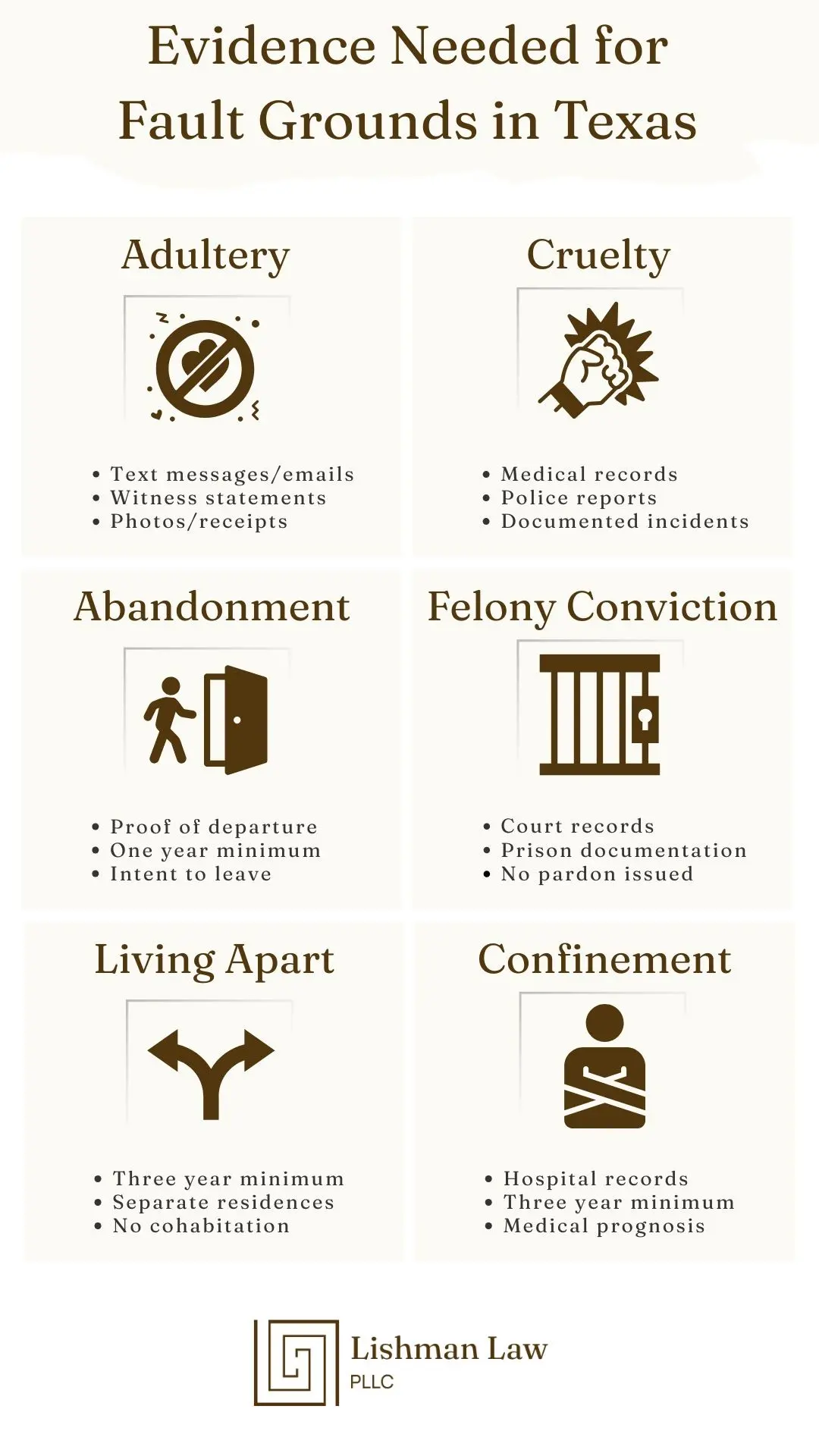All divorce decisions weigh heavily, including the choice of what grounds to file on. This decision is especially tough if you’ve heard conflicting information about “at-fault” vs. “no-fault” divorces.
As you search for the path that will best protect your interests, you might want to know if proving wrongdoing will actually make a difference in court.
Our San Antonio divorce lawyers can help you evaluate whether fault-based filing aligns with your goals. We break down how Texas law treats fault-based divorce, what grounds you can claim when filing, and how your choice impacts asset division, support payments, and timelines.
Is Texas an At-Fault Divorce State?

Yes, the Texas Family Code allows both fault-based and no-fault divorces. Under this system, spouses can choose to file based on specific wrongdoing committed by their partner, or they can simply cite the no-fault ground of “insupportability”.
While the state offers both options, the vast majority of Texas divorces proceed as no-fault cases because it is generally a simpler path forward, and can potentially have a lower divorce cost.
However, fault-based grounds remain a viable path for some filers. In certain circumstances, this type of divorce can significantly influence property division, spousal support, and other outcomes.
If you take this path, you must present evidence to the court proving that your spouse committed specific acts of marital misconduct recognized by Texas law. This evidence can include the following:
- Your sworn testimony
- Text messages, emails, and other written records
- Financial records
- Witness testimony from family members, friends, or acquaintances
A fault-based divorce may have some advantages. Proving that your spouse was in the wrong might lead to a division of community property in your favor. It could also help establish your eligibility to receive spousal support, particularly if your spouse's misconduct directly impacted shared marital assets or your earning capacity.
Grounds for At-Fault Divorce in Texas

Texas recognizes seven fault grounds for divorce. Each ground requires specific types of evidence and carries different implications for how your case may proceed and what outcomes you might achieve.
Adultery
Adultery is not a defined term under the Texas Family Code, but it is generally understood to mean voluntary sexual relations with someone other than a spouse during the marriage.
Proving adultery can be challenging since it often happens in private, and a spouse will take steps to conceal it. San Antonio courts will accept circumstantial evidence. Typical evidence of adultery may include social media posts, dating app profiles, text messages, photographs, witness testimony, hotel receipts, or credit card statements showing suspicious charges.
Evidence that shows opportunity and inclination, such as frequent overnight absences combined with suspicious communications, is often sufficient to meet the legal standard of proof.
Important note: If you suspect your spouse of adultery, be aware that state and Federal wiretapping laws prohibit accessing electronic communications without proper authorization. You may be subject to civil or even criminal liability if you “hack” into your spouse’s cell phone or accounts to look for evidence of cheating. You should consult with an experienced attorney regarding electronic communications that may contain proof of adultery.
Cruelty

Cruelty encompasses physical or mental abuse that makes living together intolerable. This ground often (but not always) involves physical violence. Severe emotional abuse, persistent threats, financial abuse, or patterns of harmful behavior may also qualify as cruelty under Texas law.
Courts look for conduct that goes beyond normal marital friction and truly makes continued cohabitation impossible. Evidence of cruelty may include the following:
- Medical records documenting injuries
- Police reports of domestic incidents
- Witness testimony from family or friends
- Text messages containing threats
- A detailed journal documenting abusive incidents with dates and descriptions
If you’re planning to leave your spouse because of their abusive or cruel behavior, consider gathering any evidence you can to help you make your case for an at-fault divorce.
Abandonment
Abandonment occurs when one spouse voluntarily leaves the marital home without intending to reconcile and lives separately for at least one continuous year.
Simply moving out during a rough patch doesn't constitute abandonment; the departing spouse must intend to permanently end the marital relationship when they leave.
Felony Conviction

This ground can apply when one spouse has been convicted of a felony during the marriage and has not been pardoned. Someone can file for divorce on the grounds of a felony conviction while their spouse remains incarcerated, as long as that spouse has served at least one year in a federal or state penitentiary or in the custody of the Texas Department of Criminal Justice.
However, courts cannot grant a divorce on this ground if the conviction was based primarily on the testimony of the spouse seeking the divorce.
Living Apart
When spouses have lived in separate residences without maintaining their relationship for at least three continuous years, either spouse can file for divorce on the ground of living apart. This ground differs from abandonment because both parties may have initially agreed to the separation and, in some cases, were open to reconciling.
Confinement in a Mental Hospital
In Texas, you can file a fault-based divorce if your spouse has been confined in a state or private mental hospital for at least three years with a mental disorder so severe that readjustment to life outside the hospital is unlikely or relapse is probable. Thorough medical documentation from qualified mental health professionals is required to support this ground.
Should You File for an At-Fault or No-Fault Divorce?

Whether you proceed with a fault-based or no-fault divorce depends on the evidence available and your goals for the outcome. Here’s an overview to help you make your choice.
When Fault-Based Filing Makes Sense
In the following circumstances, fault-based filing can provide significant advantages:
- Strong evidence is available: You possess clear proof of adultery, cruelty, or other fault grounds (social media, text messages, photographs, witnesses, financial records, etc.).
- Financial advantage matters: Your spouse directly depleted marital assets (such as spending community funds on an affair) or damaged your earning capacity in the course of their misconduct.
- Your spouse contests the divorce: You seek to obtain a divorce without your spouse’s cooperation.
You can make a more informed decision by scheduling a consultation with a San Antonio divorce lawyer.
When No-Fault Is the Better Choice
“Insupportability” doesn’t mean no one is at fault for the breakup of the marriage — it just means evidence of fault is not required to finalize the divorce. No-fault filing offers practical advantages in situations where speed, cost, and privacy matter more than assigning blame:
- Mutual agreement: You both recognize that the marriage is over and can work cooperatively on the division of assets and child custody arrangements.
- Limited evidence of fault: If you lack concrete proof of your spouse’s wrongdoing, filing for a fault-based divorce could backfire by extending your case timeline, increasing legal costs, and failing to deliver the results you seek.
- Privacy matters: With a no-fault divorce, you might be able to keep certain allegations and types of evidence out of the courts and the public record.
- Speed is a priority: No-fault cases typically resolve faster than contested fault-based divorces, allowing you to move forward with your life more quickly.
If you believe that you and your spouse will be able to compromise and communicate with each other, a no-fault divorce is likely the better path forward.
How At-Fault Divorce Grounds May Impact Your Case
The reason you are filing for divorce can affect the outcome, depending on the specific grounds and other circumstances.
Property Division
Equitable does not mean equal. Texas courts divide community property in a "just and right" manner, which doesn't mean an equal 50/50 split. When fault is proven, courts might award a disproportionate share to the innocent spouse.
Consider this hypothetical example: Your spouse not only committed adultery but also spent $50,000 of your marital funds to purchase gifts for their affair partner and take them on expensive vacations. As a result, the court might award you a larger share of your mutual savings.
Important note: Your lawyer will advocate for you and present evidence in your favor. However, the division of property in a fault-based divorce is ultimately up to the court. Judges weigh all circumstances, including each spouse's earning capacity, their children's needs, and overall fairness.
Spousal Support and Alimony

Proving fault, particularly cruelty involving domestic violence, can help establish eligibility for spousal maintenance and increase the amount or duration of support awarded. It may satisfy statutory triggers for spousal support, even in shorter marriages.
Important note: In most divorces, the marriage must meet duration requirements (typically at least 10 years) in order for a spouse to qualify for spousal support. However, if the spouse was the victim of family violence, they might receive support regardless of the length of the marriage.
Child Custody Decisions
Texas courts prioritize the best interests of the child above all else in custody determinations. Fault grounds that affect only the spouses, such as adultery, will not likely affect custody. However, cruelty, domestic violence, or felony crimes that put children at risk will significantly impact custody and visitation decisions.
Timeline and Costs
Fault-based cases generally take longer to resolve, especially if they require extensive evidence, witness preparation, and a full trial. They are also more expensive. An at-fault divorce case might start with a $5,000 attorney retainer. The total costs may increase to $15,000 to $30,000, or even higher if aspects like asset division or child custody are strongly disputed.
In contrast, an uncontested no-fault case may cost significantly less.
If proving fault could significantly impact the outcome of a divorce, the investment may prove worthwhile. This is especially likely for high-net-worth divorces.
The Process of Proving Fault in San Antonio Courts

Successfully proving fault in Bexar County family courts requires thorough preparation, meticulous documentation, and often, professional legal representation. The process involves several critical steps.
Gathering Evidence
Start documenting incidents immediately when they occur, recording information like the date, time, location, and presence of witnesses. For adultery, collect phone records, credit card statements, and photographs; for cruelty, photograph any injuries, save threatening messages, and maintain a detailed journal.
Important note: If you suspect your spouse of adultery, be aware that state and Federal wiretapping laws prohibit accessing electronic communications without proper authorization. You may be subject to civil or even criminal liability if you “hack” into your spouse’s cell phone or accounts to look for evidence of cheating. You should consult with an experienced attorney regarding electronic communications that may contain proof of adultery.
Filing the Petition
While your divorce petition must specify the exact fault ground you're alleging, specific factual allegations, such as dates, times, names, or descriptions of incidents, are not required in Texas. Be aware that even if your attorney is aware of the details, your petition will likely be vague.
Discovery and Depositions
After filing, both parties can request documents, submit written questions called interrogatories, and take depositions of witnesses under oath. This formal process allows you to gather additional evidence and assess your spouse's potential defenses.
Mediation
Many local rules for courts in Texas require parties to attend mediation before they can have a contested trial (with some exceptions for the victims of family violence). With proper preparation and strategy, guided by competent legal representation, parties often settle their disputed issues even if fault grounds are alleged.
Court Proceedings
If the case proceeds to trial, your attorney will present evidence, call witnesses, and argue that you have proved fault. Your spouse can present counterevidence and raise legal defenses. The judge will weigh all testimony and evidence before making their final decisions regarding property division, child custody, and support.
Make the Right Choice for Your Divorce
Texas gives you options when filing for divorce, allowing you to choose fault-based grounds if you have strong evidence of wrongdoing, or proceed with a no-fault filing for a more straightforward, less contentious process.
At Lishman Law, our San Antonio divorce attorneys guide clients through both fault and no-fault cases, helping you evaluate which approach protects your interests while heading off unnecessary conflict and expense. Contact us today to explore your options with an experienced family law team.

Contested fault-based divorces involve high stakes and demanding evidentiary requirements. Our San Antonio divorce attorneys have the courtroom experience and strategic insight needed to prove fault grounds and pursue the asset division you deserve.






.avif)




